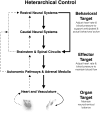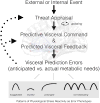Host in the machine: A neurobiological perspective on psychological stress and cardiovascular disease
- PMID: 30394781
- PMCID: PMC6220680
- DOI: 10.1037/amp0000232
Host in the machine: A neurobiological perspective on psychological stress and cardiovascular disease
Abstract
Psychological stress still attracts scientific, clinical, and public interest because of its suspected connection to health, particularly cardiovascular health. Psychological stress is thought to arise from appraisal processes that imbue events and contexts with personal significance and threat-related meaning. These appraisal processes are also thought to be instantiated in brain systems that generate and control peripheral physiological stress reactions through visceral motor (brain-to-body) and visceral sensory (body-to-brain) mechanisms. In the short term, physiological stress reactions may enable coping and adaptive action. Among some individuals, however, the patterning of these reactions may predict or contribute to pathology in multiple organ systems, including the cardiovascular system. At present, however, we lack a precise understanding of the brain systems and visceral control processes that link psychological appraisals to patterns of stress physiology and physical health. This understanding is important: A mechanistic account of how the brain connects stressful experiences to bodily changes and health could help refine biomarkers of risk and targets for cardiovascular disease prevention and intervention. We review research contributing to this understanding, focusing on the neurobiology of cardiovascular stress reactivity and cardiovascular health. We suggest that a dysregulation of visceral motor and visceral sensory processes during stressful experiences may confer risk for poor cardiovascular health among vulnerable individuals. We further describe a need for new interpretive frameworks and markers of this brain-body dysregulation in cardiovascular behavioral medicine. (PsycINFO Database Record (c) 2018 APA, all rights reserved).
Conflict of interest statement
The authors declare no conflicts of interest with respect to their authorship or the publication of this article.
Figures


References
-
- Alexander F. Factors in essential hypertension: Presentation of a tentative theory. Psychosomatic Medicine. 1939;1:173–179.
Publication types
MeSH terms
Grants and funding
LinkOut - more resources
Full Text Sources
Medical
